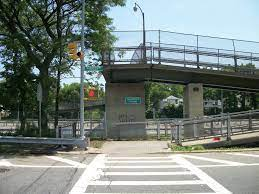If you have studied any post-Renaissance history or theology (and you thought I wasted my youth only on the things the young waste their youth on!), you have heard the question, "How many angels can dance on the head (or tip) of a pin?" The question was posed, rhetorically by 17th Century Protestants to mock Scholastics such as Thomas Aquinas and Duns Scotus, and of angelology, a hot topic among Catholic theologians of the time.
Oh, by the way, one answer to that question is: an infinite number, as angels don't occupy physical space.
(So when a former partner of mine called me an "angel"--before she knew me better, of course!--was she really referring to how skinny I was at the time?)
Now, if you are not a transportation or utility cyclist, this question may seem as esoteric as the one about celestial beings and fasteners: How many cyclists does it take to lift a cargo bike over a route barrier? I think it's the structure of the question makes it seem, at least rhetorically, as detached from any real-world concerns. Then again, it could sound like a joke like "How many surrealists does it take to screw in a light bulb?"
(The answer to that one is "Fish!" What else could it be?)
The question about cargo bikes and route barriers is important, though, if bicycles and other non-motorized vehicles are going to become an integral part of any city's transportation system. Those little fences, in zig-zag patterns at the entrance to some bike lanes and pedestrian-bike overpasses, are supposed to keep motorbikes out, but in reality, they don't. Moreover, nothing is done to enforce stated bans: On some lanes, I see four or five motorized bicycles and scooters for every traditional bicycle. Those barriers do, however, inhibit or prevent access for wheelchair users and the aforementioned cargo bikes.
There are many barriers to cycling in London, some are physical especially when riding a cargo bike. Luckily I had my trusted group of riders with me to help me out on this occasion in Roding Valley @willnorman @ternbicycles @RedbridgeLive @London_Cycling pic.twitter.com/rcxTqQmcRu
— Mariam Sayed (@MariamCycles) March 22, 2023
Possibly the worst examples I've seen are the barriers on each end of the pedestrian-bike overpasses over the Clearview Expressway (a.k.a. I-295) in the eastern part of my home borough of Queens. Not only do they inhibit access for wheelchairs and cargo bikes, they also endanger cyclists or pedestrians entering exiting them because, once you go through the barriers, there is nothing separating you from the expressway's service road, where traffic enters (on the east side) or exits (on the west) at Expressway speeds (50MPH+). I occasionally use those crossovers when cycling to or from Fort Totten or other areas along the North Shore.
 |
| If you look closely at the right side of this entrance to a Clearview Expressway overpass, you can see the zig-zag barrier. |
For a time, bicycles were actually banned as a result of an eleven-year-old boy who was struck and killed by a car when he tried to exit the overpass. In a way, that doesn't surprise me: Most planners and politicians aren't everyday cyclists or even pedestrians, so they can be depended on to simply ban something when it could be made safer. In the case of the Clearview overpasses--and, I suspect, the one in the Tweet I've included--accessing and using a lane should be made safer for all non-motorized (and wheelchair) traffic, and a ban against anything with a motor (besides a wheelchair) should be enforced.

